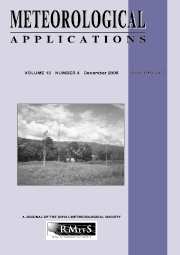Crossref Citations
This article has been cited by the following publications. This list is generated based on data provided by
Crossref.
Knollhoff, D. S.
Takle, E.S.
Gallus, W.A.
Burkheimer, D.
and
McCauley, D.
2003.
Evaluation of a frost accumulation model.
Meteorological Applications,
Vol. 10,
Issue. 4,
p.
337.
Almkvist, Esben
Gustavsson, Torbjörn
and
Bogren, Jörgen
2005.
An attempt to define the Road Climate Room.
Meteorological Applications,
Vol. 12,
Issue. 4,
p.
357.
Grimbacher, Tobias
and
Schmid, Willi
2005.
Nowcasting precipitation, clouds, and surface state in winter.
Atmospheric Research,
Vol. 77,
Issue. 1-4,
p.
378.
Grimbacher, Tobias
and
Schmid, Willi
2006.
Detecting and nowcasting cloudiness using near‐surface temperatures on winter nights.
Meteorological Applications,
Vol. 13,
Issue. 2,
p.
127.
Riehm, Mats
and
Nordin, Lina
2012.
Optimization of winter road maintenance energy costs in Sweden: a critique of site specific frost warning techniques.
Meteorological Applications,
Vol. 19,
Issue. 4,
p.
443.
Toms, Benjamin A.
Basara, Jeffrey B.
and
Hong, Yang
2017.
Usage of Existing Meteorological Data Networks for Parameterized Road Ice Formation Modeling.
Journal of Applied Meteorology and Climatology,
Vol. 56,
Issue. 7,
p.
1959.
Ou, Tinghai
Hu, Yumei
Gustavsson, Torbjörn
and
Bogren, Jörgen
2019.
On the relationship between the risk of hoar frost on roads and a changing climate in Sweden.
International Journal of Climatology,
Vol. 39,
Issue. 5,
p.
2601.
Waterworth, Damon
and
Armstrong, Alona
2020.
Southerly winds increase the electricity generated by solar photovoltaic systems.
Solar Energy,
Vol. 202,
Issue. ,
p.
123.
Adwan, Ibrahim
Milad, Abdalrhman
Memon, Zubair Ahmed
Widyatmoko, Iswandaru
Ahmat Zanuri, Nuryazmin
Memon, Naeem Aziz
and
Yusoff, Nur Izzi Md
2021.
Asphalt Pavement Temperature Prediction Models: A Review.
Applied Sciences,
Vol. 11,
Issue. 9,
p.
3794.
Coppa, Graziano
Quarello, Annarosa
Steeneveld, Gert‐Jan
Jandrić, Nebojša
and
Merlone, Andrea
2021.
Metrological evaluation of the effect of the presence of a road on near‐surface air temperatures.
International Journal of Climatology,
Vol. 41,
Issue. 6,
p.
3705.
Wang, Chuanhui
Jia, Beixi
Zhou, Jianping
Feng, Lei
and
Chen, Jian
2022.
Retrieval of Road Surface (Bridge Deck) Temperature near 0 °C Based on Random Forest Model.
Atmosphere,
Vol. 13,
Issue. 9,
p.
1491.
Zakaria, N H
Salleh, S A
Chan, A
Ooi, M C G
Isa, N A
and
Latif, Z A
2023.
Windstorm Hazardous Area Mapping Using Multi-Criteria Evaluation Techniques of Fuzzy Logic Approach.
IOP Conference Series: Earth and Environmental Science,
Vol. 1217,
Issue. 1,
p.
012036.
Swarna, Surya T.
Hossain, Kamal
and
Bernier, Alyssa
2023.
Pavement temperature model for Canadian Asphalt Binder selection: Introduction to the CPT model.
Road Materials and Pavement Design,
Vol. 24,
Issue. 3,
p.
776.
Jin, Menglin
and
McBroom, Douglas G.
2024.
Investigating Road Ice Formation Mechanisms Using Road Weather Information System (RWIS) Observations.
Climate,
Vol. 12,
Issue. 5,
p.
63.


